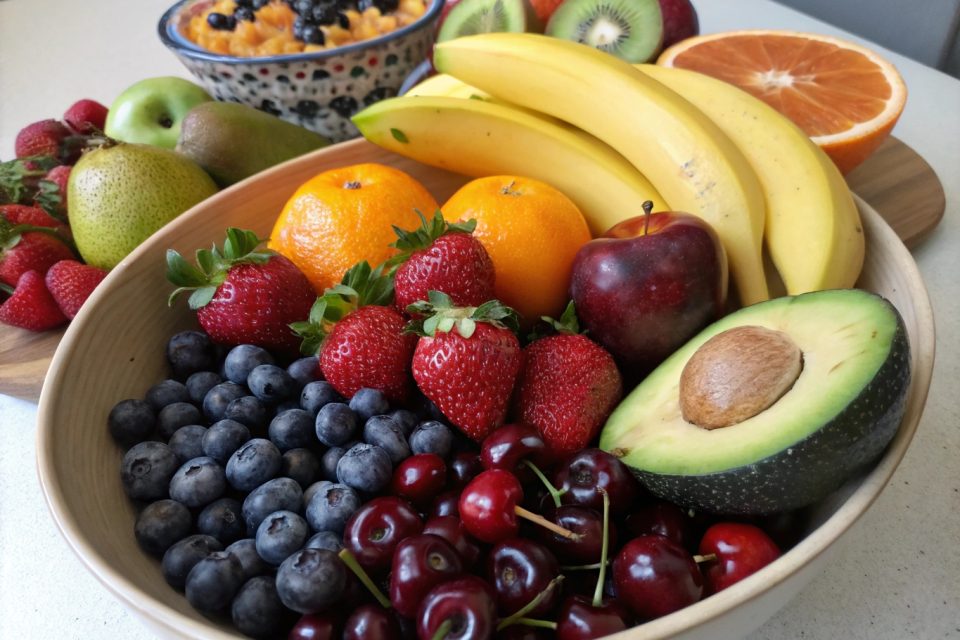Fruits are nature’s powerhouse of nutrients, packed with vitamins, minerals, fiber, and antioxidants that promote overall health. At To Eat Healthy, we’ve compiled a list of the top 10 healthiest fruits, backed by scientific studies, to help you make informed choices for a vibrant, nutritious diet. Below, we detail their nutritional value and health benefits, supported by research.

1. Blueberries
Nutritional Value (per 100g):
- Calories: 57 kcal
- Fiber: 2.4g
- Vitamin C: 9.7mg (16% DV)
- Vitamin K: 19.3µg (24% DV)
- Antioxidants: High in anthocyanins
Health Benefits:
Blueberries are renowned for their antioxidant content, particularly anthocyanins, which combat oxidative stress. A 2019 study in The Journal of Gerontology found that blueberry consumption improved cognitive function and reduced inflammation in older adults. Their high fiber content supports digestive health, while low glycemic index helps regulate blood sugar levels.

2. Apples
Nutritional Value (per 100g):
- Calories: 52 kcal
- Fiber: 2.4g
- Vitamin C: 4.6mg (8% DV)
- Potassium: 107mg (3% DV)
- Polyphenols: Quercetin
Health Benefits:
An apple a day might indeed keep the doctor away. A 2015 study in Nutrients linked apple consumption to reduced risk of cardiovascular disease due to their fiber and polyphenol content. Quercetin, a flavonoid, has anti-inflammatory properties, and the soluble fiber pectin supports gut health and cholesterol reduction.

3. Avocados
Nutritional Value (per 100g):
- Calories: 160 kcal
- Fiber: 6.7g
- Vitamin E: 2.1mg (14% DV)
- Potassium: 485mg (14% DV)
- Healthy Fats: 15g (mostly monounsaturated)
Health Benefits:
Avocados are unique for their healthy fat content. A 2020 study in The Journal of Nutrition showed that avocado consumption improved heart health by lowering LDL cholesterol levels. Their high potassium content supports blood pressure regulation, and vitamin E promotes skin health and acts as an antioxidant.

4. Oranges
Nutritional Value (per 100g):
- Calories: 47 kcal
- Fiber: 2.4g
- Vitamin C: 53.2mg (89% DV)
- Folate: 30µg (8% DV)
- Antioxidants: Hesperidin
Health Benefits:
Oranges are a vitamin C powerhouse, boosting immune function. A 2018 study in Frontiers in Immunology noted that vitamin C enhances immune cell activity. Hesperidin, a flavonoid, supports vascular health, and the fiber content aids digestion and stabilizes blood sugar.

5. Strawberries
Nutritional Value (per 100g):
- Calories: 32 kcal
- Fiber: 2g
- Vitamin C: 58.8mg (98% DV)
- Manganese: 0.4mg (19% DV)
- Antioxidants: Ellagic acid
Health Benefits:
Strawberries are rich in vitamin C and antioxidants like ellagic acid. A 2021 study in Antioxidants found that strawberry consumption reduced markers of oxidative stress and inflammation, potentially lowering chronic disease risk. Their low calorie content makes them ideal for weight management.

6. Bananas
Nutritional Value (per 100g):
- Calories: 89 kcal
- Fiber: 2.6g
- Potassium: 358mg (10% DV)
- Vitamin B6: 0.4mg (20% DV)
- Carbohydrates: 22.8g
Health Benefits:
Bananas are a great source of potassium, which supports heart health and muscle function. A 2017 study in The American Journal of Clinical Nutrition linked potassium intake to reduced blood pressure. Their natural sugars and B6 content provide sustained energy and support mood regulation.

7. Kiwi
Nutritional Value (per 100g):
- Calories: 61 kcal
- Fiber: 3g
- Vitamin C: 92.7mg (154% DV)
- Vitamin K: 40.3µg (50% DV)
- Antioxidants: Actinidin
Health Benefits:
Kiwi’s high vitamin C content boosts immunity and skin health. A 2020 study in Nutrients found that kiwi consumption improved sleep quality due to its serotonin precursors. The enzyme actinidin aids protein digestion, and its fiber content promotes gut health.

8. Pomegranates
Nutritional Value (per 100g):
- Calories: 83 kcal
- Fiber: 4g
- Vitamin C: 10.2mg (17% DV)
- Vitamin K: 16.4µg (21% DV)
- Antioxidants: Punicalagins
Health Benefits:
Pomegranates are rich in punicalagins, potent antioxidants. A 2019 study in Pharmacological Research found that pomegranate juice reduced blood pressure and improved arterial health. Their anti-inflammatory properties may also lower the risk of chronic diseases like cancer and heart disease.

9. Mangoes
Nutritional Value (per 100g):
- Calories: 60 kcal
- Fiber: 1.6g
- Vitamin C: 36.4mg (61% DV)
- Vitamin A: 54µg (6% DV)
- Antioxidants: Mangiferin
Health Benefits:
Mangoes are packed with vitamin C and A, supporting immunity and vision. A 2022 study in Food & Function highlighted mangiferin’s role in reducing inflammation and protecting against oxidative stress. Their fiber content aids digestion, and their natural sweetness makes them a healthy dessert option.

10. Cherries
Nutritional Value (per 100g):
- Calories: 63 kcal
- Fiber: 2.1g
- Vitamin C: 7mg (12% DV)
- Antioxidants: Anthocyanins
- Melatonin: Trace amounts
Health Benefits:
Cherries, particularly tart varieties, are rich in anthocyanins and melatonin. A 2018 study in Nutrients found that tart cherry juice improved sleep duration and quality. Their anti-inflammatory properties may also reduce muscle soreness and arthritis symptoms, per a 2020 Journal of Functional Foods study.

